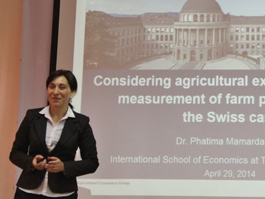“Considering agricultural externalities in the measurement of farm performance: the Swiss case” was the title of a presentation given by Dr. Phatima Mamardashvili at ISET on April 29.
Dr. Mamardashvili’s research is about agricultural externalities. In her talk she presented a study that investigates the performance of Swiss dairy farms, considering both positive and negative externalities. The results are based on the bookkeeping data of farms as included in the Swiss Farm Accountancy Data Network (FADN). The economic and environmental performance of these farms are measured from the perspective of production efficiency.
The analyses employ stochastic frontier analysis (SFA), a parametric approach that takes the stochastic nature of the data into consideration.
The results of economic performance show that Swiss dairy farms are, on average, highly technically efficient (TE). The mean TE value varies between 0.93 and 0.95, depending on the region. Despite there being some potential for improvement, Swiss dairy farms appear to be well adapted to the current natural and regulatory environment. In contrast, the environmental efficiency (EE) across farms varies greatly. A relatively low mean EE value (0.47) indicates that the nitrogen pollution from Swiss dairy farms has the potential to be considerably reduced. Improving farms’ environmental performance with regard to nitrogen pollution may be achieved by decreasing farming intensity (the stocking rate) and encouraging full-time farming.
In addition, Dr. Mamardashvili estimated the farmers’ nitrogen abatement costs. The average cost amounted to 20 Swiss francs per kg of nitrogen surplus. The obtained abatement costs are highly variable across farms. This variability hints at the ineffectiveness of current policy measures for reducing nitrogen pollution and suggests the use of market-based instruments, such as taxes. However, the high costs involved in reducing pollution caused by Swiss dairy farms show the need for higher taxes, the implementation of which will probably be very difficult from a political perspective.
We would like to thank to Dr. Mamardashvili for presenting a very interesting, informative and useful seminar to the ISET community.











